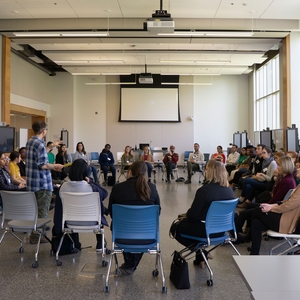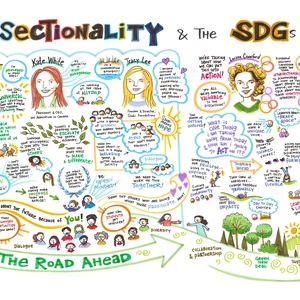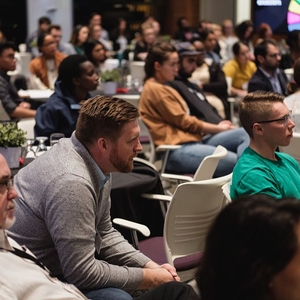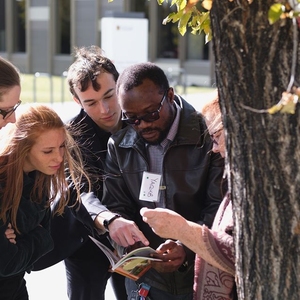Building campus capacity for the SDGs: a case study of the SDG Summit conference
University of Calgary
Project Overview
The SDG Summit is an annual training conference at the University of Calgary that is focused on engaging youth with the Sustainable Development Goals (SDG) through immersive opportunities for learning, discussion, and networking. This hands-on event seeks to equip youth with the knowledge and skills they need to champion sustainable development and to develop innovative solutions to social, environmental, and economic issues. In the 2019 iteration of the SDG Summit, “Intersectionality and the SDGs”, we explored the various ways power and privilege influence sustainable development and the intersecting nature of the SDG framework. The 2019 SDG Summit opened with stories from Elder Kerrie Moore and a keynote presentation on reconciliation and decolonization by Larissa Crawford. Rooted in these conversations of identity and power, three breakout workshops covering topics such as ecofeminism and urban development were offered throughout the conference before a closing panel discussion and guided workshop on action planning. Organized by the student-run Sustainable Development Goals Alliance (SDGA), over 350 students and 30 community partners have attended the SDG Summit over three iterations from 2017-2019.
Background
The SDG Summit concept was developed in 2017 and was designed to raise awareness of the 17 SDGs within the campus community. In recognizing a gap in awareness and energy amongst campus clubs and organizations, an interdisciplinary group of students formed to identify ways that students could gain knowledge, resources, and connections to implement and advocate for sustainable development. As students ourselves, creating an initiative that was relevant to the needs and interests of the broader university community was consistently at the forefront of our program design. By focusing on this population, we sought to engage youth changemakers in our campus community who could continue to spark conversations about the SDGs amidst our socio-political environment that is closely tied to resource extraction in the oil and gas industry. Our team chose a conference model as an ideal format to convene students across the campus and community to spark discussions and skill-building. The first SDG Summit in 2017 laid the foundation for SDG-centered student programming on-campus and led to the development of the larger Sustainable Development Goals Alliance. Utilizing a large-scale, student-centric training conference to convene and amplify the voices of student leaders has allowed us to facilitate new learnings and connections, and has created a permanent SDG-specific initiative on campus that continues to grow each year.
Goals
The SDG Summit is a student-centric training conference. Each year, this initiative centers around a different theme (2017 - SDG Youth Training; 2018 - Local Action, Global Impact; 2019 - Intersectionality and the SDGs) which guides discussions and workshops. Across each of the overarching themes, the central goals of the SDG Summit have been to:
- Build awareness of the SDGs within the campus community
- Equip students with skills to engage in SDG implementation
- Convene youth sustainability leaders to facilitate knowledge-sharing and collaboration
The SDG Summit is designed with these goals in mind by creating a balance of programming that facilitates learning, networking, and skill-building. Throughout the day, attendees listen to keynote presentations, engage in small-group workshops, and synthesize overarching topics in large-group discussions with networking opportunities integrated throughout the conference.
Implementation
Over the project’s lifetime, student voices and leadership have been central to the implementation of the SDG Summit. Each year a committee of students at the University of Calgary is established to lead the event's organization and execution. Students are supervised and managed by the student-run SDGA, with additional financial and logistical oversight from the institutional Office of Sustainability. This unique partnership structure has resulted in student voices and perspectives being centered in the project’s leadership, thus ensuring that the conference itself adequately addressed the needs and interests of our student and youth audiences. The student committee convenes 4-5 months before the SDG Summit and is typically composed of 9-12 students. The planning process is split into three teams that are tasked with focusing on a specific-area of the planning process and are accountable to the broader team for their progress. The programming and logistics team focuses on developing the programming for the conference, such as workshops, training activities, and keynote presentations while also organizing logistics such as venue, catering, and scheduling. The communications and marketing team focuses on developing a marketing strategy and digital presence to advertise the SDG Summit to a broad range of students, community members, and local organizations. Finally, the sponsorships team focuses on seeking local buy-in and support from businesses and organizations.
Following the SDG Summit, the committee is disbanded until another call for members is announced in the following year when the planning process restarts. This model of having a specific team dedicated to the project’s implementation, year after year, has proved successful in creating a unique sense of community for those involved as well as significant leadership development opportunities. Since this committee is given a higher amount of autonomy, students who have worked on implementing the SDG Summit have often embraced significant leadership roles and responsibilities due to the nature of this large-scale event.
Timeline
The SDG Summit initiative started in May 2017 and is currently on-going. The first SDG Summit was held in September 2017, with subsequent Summit conferences occurring in 2018 and 2019. The fourth iteration of the SDG Summit is expected to take place in October 2020. The following link outlines the timeline for key milestones in the implementation of the SDG Summit initiative:
https://docs.google.com/document/d/1HSY99bz6hVPIzIz0z4dqNkh4V-KYnYJp_ozJVgxSIQ8/edit?usp=sharing
Financing
Over the past three years, significant partnerships have been established to support the financing of the SDG Summit initiative. Over the past two years, the SDGA has received a $10,000 budget from the University of Calgary Office of Sustainability to support the SDG Summit initiative. This funding is used to secure the venue, order catering, as well as to pay keynote speakers, provide honorariums for Elders, and to offset transportation costs for invited facilitators. Additional funding and in-kind contributions over the years have also been secured from other community and governmental partners such as the Canada Service Corps and Mama na Mtoto.
A detailed budget for the 2019 SDG Summit is outlined in the attached link and is reflective of the most up-to-date costs associated with this initiative as it has grown over the past three years:
https://docs.google.com/document/d/1w9T0hOY_8jpDvPjVSs8ZXCPLuLrFb9955c7MsI1Qno0/edit?usp=sharing
Results
Over the past three years, the SDG Summit has engaged with over 350 student, community, and professional leaders in sustainable development. At the individual level, participants at the SDG Summit have reported experiencing positive learning experiences, valuable networking opportunities and strengthened personal capacity to take action in their local communities. In navigating successes and challenges over three iterations of this conference, members of the SDG Summit planning committee have also been able to develop a well-rounded understanding of sustainable development and important skills in leadership, communication, problem solving, and project management. At the community level, this annual event is a permanent fixture in the University of Calgary’s student-led sustainability programming, and is well-known across campus as a valuable learning and networking opportunity for students interested in sustainable development. As the flagship initiative of the SDGA, the SDG Summit has also built a strong foundation on which to showcase, grow and generate momentum for further student-led projects centered around the SDGs. By creating spaces for learning, skill development, and discussion, this project has enhanced the collective understanding and need to take action on the SDGs among students, and has attracted recognition and support from institutional offices at the University of Calgary and the surrounding community. Below is a narrative summary of outcomes of each iteration of the SDG Summit, from 2017-present.
SDG Youth Training Day - September 30, 2017 The first SDG Youth Training Day was held at the University of Calgary in partnership with the Foundation for Environmental Stewardship (FES). The day began with a keynote address from Dino Corell, a program analyst for the International Labour Organization at the United Nations. In addition to sessions hosted by FES on skills development and project implementation, the conference also included a networking fair and a World Cafe, where participants discussed questions on youth involvement in SDG implementation in small table groups. These conversations were recorded by Sam Hester, a graphic recorder based at the 23rd Story. Although there were a number of areas of improvement identified from this event, including the need for more variety in session types, greater student ownership over the conference’s programming, and more comprehensive evaluation practices, this project was a valuable learning and leadership development experience for all members of the planning committee. Positive feedback from participants also demonstrated a high level of interest and engagement in the SDGs within the campus community, and inspired a commitment from the organizing team to planning additional SDG-centered events in the future.
SDG Summit: Local Action, Global Impact - September 22, 2018 The success of our 2017 event and extensive community interest in the SDGs encouraged us to rework the previous year’s event into the first named SDG Summit, which took place at the University of Calgary on September 22, 2018. Building off of the momentum and enthusiasm from the inaugural event, 2018 was the first year where the committee partnered with the University of Calgary Office of Sustainability. The theme of “Local Action, Global Impact” was chosen to encourage participants to assess how their local actions can scale up and impact the global community. The day was opened with a keynote address from Dr. Jennifer Winter, a public policy expert at the University of Calgary. Participants were then able to participate in a series of breakout workshops, which used interactive formats such as small group discussions, panels, activities to discuss topics including anti-racism advocacy and Gender-Based Analysis+. The day was closed with an “SDG Hackathon”, where groups of participants with common interests were guided through a brainstorming tool to transform their ideas to action. Following the formal program, an SDG Reception featuring a number of student clubs and community organizations was organized to facilitate further networking and connect students with opportunities for further involvement.
Feedback collected from attendees described the 2018 SDG Summit as an “inspiring, thought-provoking, and collaborative” event. The large majority of participants reported that the Summit increased their knowledge of current SDG initiatives and how youth can get involved, and that the event prompted them to consider an SDG or other topic in a new light. Key takeaways from the event included the importance of collaboration and innovation in advocating for the SDGs, and the diverse interdisciplinary factors that influence global issues.
**SDG Summit: Intersectionality and the SDGs - October 5, 2019 ** The 2019 SDG Summit was held on October 5, 2019 at the University of Calgary. The conference was centered around the theme of “Intersectionality and the SDGs”, inviting participants to explore how complex systems of privilege and oppression can contribute to or challenge sustainable development, while highlighting the need for inclusive and multidisciplinary collaboration in creating a sustainable future. The SDG Summit was opened with a keynote address from Larissa Crawford, an anti-racism and Indigenous researcher who spoke on the importance of centering Indigenous reconciliation in sustainable development work. Three breakout workshops were offered, focusing on topics including ecofeminism, sustainable urban development, and life-cycle assessments. A networking lunch featuring student clubs, artwork, staff and faculty projects, and community organizations provided another opportunity for attendees to build new connections and pursue volunteer and research opportunities. The day was closed with a synthesis activity led by Larissa Crawford, who facilitated a reflection and discussion with participants to map next steps. This conversation and summaries from the day were recorded graphically by Sam Hester, from the 23rd Story.
Feedback received from attendees highlighted the engaging and informative nature of Larissa Crawford’s keynote address and synthesis activity. The majority of participants were able to increase their understanding of the SDGs, connect with like-minded individuals, and learn about new topics and areas of knowledge.
SDG Summit - Looking Ahead to 2020-2024 In March 2020, the SDG Summit initiative was able to gain valuable institutional support and recognition, as well as long-term funding, with the receipt of a University of Calgary Students’ Union Quality Money grant, totalling $90,740 over a four-year period. Quality Money is a partnership between the Students’ Union and University of Calgary that invests $1.65 million annually in campus projects that enhance the overall quality of the student experience. This funding will ensure the long-term continuation of the SDG Summit and also fund additional initiatives year-round to continue building student leadership capacity with SDG implementation. With the receipt of this grant, we are excited to amplify the reach and impact of the SDG Summit, and to implement the Sustainability Leadership Innovation Program, a longitudinal leadership development program that supports groups of students in developing a sustainability initiative at the University.
Lessons Learned
The SDG Summit Planning Committee has learned valuable lessons in event planning and student engagement over the past three years of organizing this initiative. Through a process involving comprehensive evaluation, innovative and adaptable thinking, and an openness to reflection and growth, we have been able to gather key learnings to continuously improve the event. In addition to growing into a valuable SDG engagement event for the campus community, the SDG Summit has also been a valuable leadership and professional development experience for students involved in its organization. Some key lessons learned include: * Conversations around sustainable development and the SDGs should center equity and intersectionality at their forefront, including lifting and amplifying the voices of marginalized and underrepresented gender, sexual, ethnic, ability, cultural, and other identity groups. When planning such an event, it is important to consider the diversity of speakers, use appropriate and intentional messaging, and follow appropriate cultural protocols, including meaningfully acknowledging the land upon which the event takes place. * Aim to adopt sustainable event practices to reduce the environmental impact of your event, in line with your budget and capacity. Some examples include: selecting an accessible venue located close to public transport, reducing/eliminating print materials, avoiding single use items such as bottled water and disposable dishware, and choosing vegetarian and vegan catering options when possible. * Over three years, tickets for the SDG Summit ranged from $0-$25. We found that a higher ticket price increased the perceived value of the event, but also created financial barriers for students, our target audience. Lower ticket prices reduced these barriers, but also decreased the perceived value of the event, resulting in a lower percentage of ticket buyers showing up on the event day. An optimal price for tickets for a student-centered event would likely range from $5-$15, with subsidies available to reduce barriers to participate. * The SDG Summit Planning Committee leveraged a number of partnerships with institutional offices and community organizations during the event-planning process, which played a key role in the success of this initiative. Specifically, we were able to find support from the Office of Sustainability, Cumming School of Medicine, and University of Calgary International, as well as community organizations such as the Alberta Council for Global Cooperation. Although we recognize that building partnerships is often dependent on the context, capacity, and culture of one’s campus, they can be an important support in promoting, funding, and participating in the event. * Build in a comprehensive monitoring and evaluation strategy at the outset of your event planning. Evaluation surveys administered during and after the SDG Summit provided us with quantitative and qualitative data that allowed us to identify successes and areas of improvement for the event. Formal reports generated by the team also provided a written narrative of the highlights, success, and challenges of each SDG Summit, and both were distributed to funders and retained as an internal resource for future years. * Maintaining a healthy and collaborative team dynamic within the SDG Summit Planning Committee was key to our initiative’s success. In addition to clearly delegating responsibilities among two Co-Chairs and three sub-committees, we cultivated a team environment based on values of open communication, inclusivity, and creative thinking.




